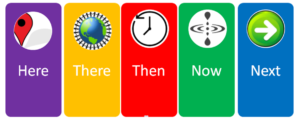Geography
Living to learn, learning to live.
Aim: That pupils develop a sense of place and people.
We have designed a vocabulary rich curriculum that connects learning by building an understanding of ideas, concepts, chronology and themes through the framework of ‘here, there and then, now, next’. These thinking threads link learning meaningfully to create opportunities to learn from the past and present as well as equipping children for an ever-changing and exciting future.
In Geography pupils are taught about the world and its people in ways which encourage curiosity and fascination about the diversity of people, environments and Earth’s physical and human processes, the world here and now, learning from past environments then, and developing the tools to navigate global challenges next, fostering environmental stewardship.
Pupils are taught to use geographical skills such as collecting, analysing data and interpreting and communicating geographical information. Practical learning is recognised as an important aspect of Geography, teachers plan exciting field trips that challenge pupils understanding of the local world around and allow them to practice the skills of field work and map skills.
Spring Term Topics
Please see below for details of the Geography units being covered in each class during the Spring term.
Busy Zone - Animals (around the world)
Building on my local area study, We will explore the weather, setting up a weather station and making wind streamers and discovering ways to record, compare and contrast our observations.
Linked with science we will explore animals in our locality with a focus on farming.
Scaling out we will compare animals in the UK to animals in the polar regions.
We will further our understanding of Human and Physical geography by picking our features and comparing these within our own locality to other places around the world.
Wonder Zone - Besides the Sea
The primary objective of this enquiry is to enable pupils, as young geographers, to identify and begin to understand the key physical and human geographical features of the seaside as one example of the broader concept of ‘coasts’. Pupils can come to understand that the seaside is only one example of the many different places around the world, where the land meets the sea. Pupils will develop their understanding of the inter-relationship of people with their environments at both local and global levels.
Smart Zone - How and why is my local area changing?
A study of Helston Railway.
In this unit the concept of change is developed and illustrated through the familiar surroundings of the school and the immediate local area. Fieldwork provides an ideal context to introduce the idea if hypothesis generation and testing through data collection and interpretation.
Study Zone - Who are National Parks for?
This unit begins on a national scale as pupils establish where National Parks are located, the factors behind their distribution and their associated purposes.
As the investigation progresses, the scale of the study moves to a regional perspectives before widening to a global perspective to study the National Parks of the United States.
Autumn Term Topics
Please see below for details of the Geography units being covered in each class during the Autumn term.
EYFS - My School, My Grounds, My Area
Where do we live? A study of the local environment and places that are important to me. A walk to the local housing estate -Plovers Field and links to map making. We will look at photographs / have a drive on the minibus to look at the areas of local importance to the children and areas of familiarity- Understanding how places have similarities and differences.
Name human and physical features of the local area.
EYFS OutlineYear 1.2 - What is the Geography of where I live?
The aim of this unit is to introduce pupils to what geography is all about! Firstly pupils are encouraged to distinguish between geographical features that are essentially ‘human’ in origin and those physical features that are natural or at least semi-natural. Pupils are able to use GIS Geographical information system) data on Google Earth and Digi map together with their own local filed work recoding and interpreting to consolidate their understanding.
Year 1.2 OutlineYear 3.4 - How can we live more sustainably?
This unit will build upon the pattern of enquiry from KS1, beginning with the familiar and extending outwards in scale to consider the less familiar and finally a range of unknown locations on a global scale. Pupils are then introduced to the concepts of sustainability and sustainable development.
Year 3.4 OutlineYear 5.6 - Why are mountains so important?
This enquiry introduces pupils to the physical and human importance of a biome that covers one-fifth of the world’s land surface. The study of mountains enables pupils to comprehend concepts of physical geography such as plate tectonics and the formation of different rock types, as well as erosion and geological deep time. From a global scale, pupils then turn their attention to the location and distribution of mountains in the United Kingdom.
Year 5.6 Outline
















